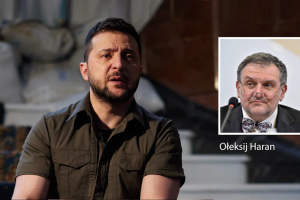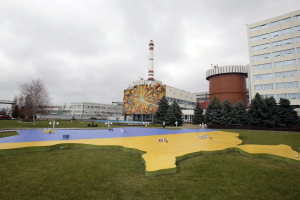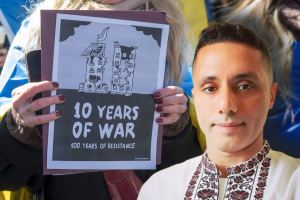Petro Burkovskiy and Anastasiya Polishchuk - for Detector Media
One of the most important events in early March that attracted the attention of Russian propagandists was the mass protests in Georgia that erupted on March 7 on the eve of the country’s parliament’s attempt to pass a bill on transparency of foreign influence, which is very similar to Russian legislation on “foreign agents”. On the first day, slogans such as “No to Russian legislation!” and “Stand on the right side of history!” were heard outside the Georgian parliament. The US Embassy called these events “a black day for Georgian democracy”.
Using Semantrum, we tallied approximately 400 references to this topic in Russian online and printed media between March 10 and 15. The most widely publicized events in Russia were the anti-European, pro-Russian rallies where demonstrators burned the EU flag and chanted slogans in support of Moscow’s course.
But first, let’s look at the anti-government protest. “Protesters are destroying buildings, demanding to ‘free’ their way to Europe and NATO”, the Russian media outlet Tsargrad TV described the first day of the protests. “The security forces had to use water cannons and tear gas to disperse the aggressive demonstrators. As a result of the clashes, many police officers were injured and hospitalized”.
According to the Russian media, the reason for the anti-government protests was the United States, which allegedly sought to change the government in Georgia with the help of Georgian youth and Ukrainian refugees:
“Radical circles in the United States do not like the balanced position of the current Georgian leadership: the government remains neutral in the Russian-Ukrainian conflict, developing trade and tourism relations with the Kremlin” (X-True.info).
The next step of the Russian media was to exaggerate the threat of Georgia splitting into two camps. To this end, Russia widely covered the rallies of pro-Russian and anti-European Georgian activists.
For example, on March 14, Georgian organizations Conservative Movement and Alt-Info held a rally during which pro-Russian protesters burned the EU flag near the parliament.
This is how the Russian media portrayed the incident:
- "For the second day in a row, a rally against foreign influence on Georgia, for the preservation of family values and stability in the country is being held in the center of Tbilisi. The participants of the rally demanded to establish relations with Russia" (Krasnaya Vesna news agency, March 15, 2023);
- "Thousands of Georgian conservatives took to the streets of Tbilisi today and began a rally against Western influence near the parliament building. The protesters support the country's authorities' policy of countering foreign influence and advocate normalization of relations with Russia" (Kont, March 14, 2023);
- "Georgian residents protest against the country's rapprochement with the European Union" (Online47.ru, March 14, 2023);
- "This time, people came out against the destructive influence of the West and criticized the participants of the previous protests against the law on foreign agents" (Novokakhovskaya Pravda, March 14, 2023). The same publication calls it "The Georgia of a healthy person" [reference to a meme format originating from social ads contrasting alleged smokers’ lungs with healthy person’s lungs].
Russian propaganda highlights the shared heritage and kinship between the Georgian and Russian peoples and warns of the potential destruction of Georgia if pro-Western forces gain power.
- "The United States is trying to implement its anti-Russian scenario through Georgia, and Georgians are not going to go along with it because, being nationalists, patriots, technocrats, they feel good about Russia. Tbilisi understands that if Russia turns its attention south, the state of Georgia as such may disappear altogether" (Ukraina.ru, March 15, 2023).
- "Georgia is just a smaller version of Ukraine, another cog in the American 'instability belt'" (Tsargrad TV, March 11, 2023).
- "The Americans will still try to carry out a coup d'état in Georgia, and the majority of Georgians will be under the pressure of the pro-Western regime. Civilians do not want to allow this to happen" (Svobodnaya Tribuna, March 15, 2023).
Furthermore, the Russian media is also amplifying the baseless allegations made by pro-Russian members of the Georgian parliament, which claim that the Ukrainian government was involved in planning the anti-government protests in Tbilisi:
- "Georgian authorities accused the Kyiv regime of preparing a coup d'état in Tbilisi. Zelenskyy's government had no arguments to respond, and Banderite diplomats had to embarrass themselves with statements about ‘Putin's propaganda’" (Bloknot.ru, March 15, 2023);
- "The Georgian Prime Minister accused Ukrainian President Volodymyr Zelenskyy of interfering in his country's affairs, a statement commented on the air of the Mneniye program by political analyst Shota Akhaidze" (Svobodnaya Tribuna, March 15, 2023);
- "Several dozen people from Ukraine came to the protests. They came to destabilize the situation in Georgia" (Kont, March 15, 2023);
- "Sticking its nose into all world events seems normal and important for Ukraine. Probably, everything is so ‘good’ in their country that Ukrainian politicians decided to give advice to Georgia, where Western leaders are trying to ignite another Maidan" (Kont, March 15, 2023).
The Moscow Post published an extensive historical account that purportedly “explains” how the United States has been plotting a coup d’état in Georgia since 2003.
“It all started with the ‘Rose Revolution’, which was essentially a covert operation by the US State Department. It was extremely important for Washington to reduce the ‘Moscow factor’ in the former Soviet republics and replace pro-Russian leaders with pro-Western ones. At the same time, an important caveat is that there is an element of hypocrisy when support from the United States is the right thing to do, and support from the Russian Federation is an attempt by the Kremlin to interfere in Georgia’s internal affairs”.
Furthermore, Russian media outlets are reporting on calls for a second front against Russia in the Caucasus, which would involve attempts to reclaim the occupied regions of Abkhazia and Ossetia. The reports also highlight Georgian revanchist sentiments and allege that the United States has made multimillion-dollar investments to prepare Georgia for the potential return of these territories.
- "The US intends to turn Georgia into a second front for the war with Russia. A 'Maidan' is about to break out in the country. Protesters are destroying buildings, demanding to ‘free’ the way to Europe and NATO. Chanting the anthem of the ‘not yet perished’ [first words of the Ukrainian anthem], the protesters demanded ‘to return Abkhazia and South Ossetia to Georgia’” (Narodny Politolog, March 14, 2023);
- "Washington and Kyiv have long dreamed of opening a ‘second front’ against Russia. In this regard, they see the outbreak of hostilities in Abkhazia as very promising" (Podmoskovye Segodnya, March 14, 2023).
Putin’s messages
Semantrum’s data shows that Vladimir Putin remained the focal point of Russian media in the first half of March, with major Russian media outlets mentioning the Kremlin leader approximately 2,300 times in just five days.
During the first half of March, Kremlin statements were abundant. On Russia 1 TV channel, Putin asserted that “the United States continues to occupy Germany” and that nationalism in Ukraine has long been fueled by the West. He also claimed that “Europeans have lost the gene of independence” and “the instinct of national interest”. “The more they are hit on the nose or on the head, the more they bend and the wider they smile” (RosBusinessConsulting, March 14, 2023). Such statements are intended to demonstrate disdain for the West and Western values and, accordingly, for Ukraine as a “puppet” of Europe and the United States.
Overall, Putin’s statements continue to emphasize the need for society to unite against fascists and “Ukrainian Nazis” while promoting the idea of an inevitable victory for the Russian army and the need to move “only forward”. Gazeta.ru quoted the Russian president as saying that “when the enemy sees that Russian society is ‘strong, internally united, consolidated’”, “in this case, without any doubt, what we are striving for will happen” (Gazeta.ru, March 14, 2023).
The primary news stories were comprised of the following events and statements.
- Comments on the explosions at Nord Stream and further investigations by Western media.
The issue of Nord Stream and the alleged involvement of the United States in sabotage has been a persistent topic in Russian media since September 2022. In response to the emergence of the “Ukrainian trace” theory, Russia has been actively refuting and denying any such involvement.
During an appearance on Russian Channel One’s Bolshaya Igra talk show on March 10, Russian Foreign Minister Sergei Lavrov stated, “Of course, we will think about how to respond to the West to this direct attack, a direct attempt on our property”.
In an interview with Argumenty I Fakty on March 13, Russian Security Council Secretary Nikolai Patrushev dismissed the theory of a “Ukrainian trace”, stating that “any accusations that are not supported by the results of an impartial investigation cannot be trusted. That is why it is necessary to conduct an objective international investigation with the participation of our country”.
On March 14, the Russian president put an end to the debate, stating that “The fact that this is a terrorist attack is no longer a secret, I think everyone has already recognized this. And the terrorist attack, quite obviously, was committed at the state level because no amateurs can carry out such actions” (Izvestia, March 14, 2023).
Putin dismissed the theory of Ukrainian involvement in the Nord Stream explosions in a statement, stating that the information is “complete nonsense”. He argued that only professionals could have carried out the explosions at Nord Stream. (REGNUM, March 15, 2023).
During the first half of March, several other significant topics emerged in the media space:
- Russia's isolation and gap with the West are continuing to grow. In the winter months, the Russian Cabinet of Ministers proposed to suspend the application of international treaties of the Council of Europe to Russia. On January 17, the bill was submitted for consideration, but only now are we seeing the details and consequences of the decision. Russia has stopped participating in the Eureka science and technology program, as well as other educational initiatives in Europe and the United States (Lenta.ru, March 15, 2023). The January bill is being implemented, and in the long run, it may negatively impact Russia's scientific and technological potential.
- Talks with Syrian President Bashar al-Assad. Bashar al-Assad arrived in Moscow on the evening of March 14. It is worth noting that this visit to the Kremlin was his first since the beginning of Russia's full-scale invasion of Ukraine (the last time the presidents of Russia and Syria met was in September 2021). After the meeting, a statement was released on bilateral relations between Russia and Syria, which remain partners in the international arena: "The Russian Federation will continue to fight international terrorism and will support the legitimate Syrian government in the fight against terrorism" (TASS, March 14, 2023). The meeting also "discussed issues of bilateral cooperation in the political, trade, economic, and humanitarian spheres, as well as prospects for resolving the situation in Syria" (Argumenty I Fakty, March 14, 2023).
Amidst increasing international isolation, the Kremlin is attempting to present an image of active participation in “international life” while shaping public perception of the world being divided into “friends” such as Syria and Iran and “enemies” who aim to surround and dismantle Russia.
Messages about Volodymyr Zelenskyy
The second prominent figure in Russian propaganda is, as usual, Volodymyr Zelenskyy. According to Semantrum, from March 10 to March 15, the Russian media contained over 800 references to the Ukrainian President.
The Russian media primarily mentioned Zelenskyy in the context of the March protests in Georgia, often pointing to Kyiv’s alleged “influence” on the outbreak of the protests and the subsequent course of events.
- "Zelenskyy not only provoked protests in Tbilisi but also prepared the opening of a 'second front' against Russia in Georgia. And [he did it] in advance, back in 2021" (Kont, March 15, 2023);
- "Ukraine's special services set neighbors on fire to harm Russia" (REGNUM, March 14, 2023).
And this time, Russian propaganda is playing into the hands of Prime Minister Irakli Garibashvili, who “advised Zelenskyy to ‘take care of himself and his country first’” (Ukraina.ru, February 14, 2023).
Zelenskyy was further accused of persecuting Orthodox Christians. At the same time, Russian propaganda actively used the “direct statements” of the senior clergy of the Ukrainian Orthodox Church of the Moscow Patriarchate. In particular, regarding the demand to leave the Kyiv-Pechersk Lavra by March 29.
- "Monks demanded that Zelensky 'not offend' the Kyiv-Pechersk Lavra" (Moskovsky Komsomolets, March 15, 2023).
This statement resonated not only among the priests of the Moscow Patriarchate in Ukraine but also among the religious community in Russia. On March 14, RIA Novosti and other major Russian media quoted Viktor Medvedchuk as saying that “Zelenskyy is taking away the faith of Ukrainians, which even the Nazis never did”. REGNUM stated that Christian leaders in the United States “prefer to ignore the persecution of the Ukrainian Orthodox Church by Ukrainian President Volodymyr Zelenskyy”.
Russian Foreign Minister Lavrov also did not stand aside, calling on the UN and OSCE to “prevent the eviction of UOC monks from the Kyiv-Pechersk Lavra” (RosBusinessConsulting, March 14, 2023).
The Battle of Bakhmut
Another significant topic for Moscow’s propaganda efforts is the ongoing battle for Bakhmut (also known as Artyomovsk in Russian media). On March 14, the Supreme Commander-in-Chief’s Staff held a meeting where the participants expressed a shared position on the continued defense of Bakhmut.
It is worth noting that Russian propagandists reported on the meeting with little or no commentary, with only a few reports highlighting the “devastating consequences for Zelenskyy”. However, the Russian media extensively covered a statement by US Secretary of Defense Lloyd Austin, who expressed support for the decision of the Ukrainian commander-in-chief. Russian media outlets stated that “the US leaves it to Zelensky to decide how to deal with Artemivsk, but the loss of the city will not mean Kyiv’s defeat” (RIA Novosti, March 15, 2023).
While the Russian media as a whole emphasize the intentions of the Ukrainian Armed Forces to hold Bakhmut, and Prigozhin talks about a Ukrainian counteroffensive (Lenta.ru, March 14, 2023), some propagandists quote “expert threats” from former American military officers.
- "US warns Ukraine of devastating consequences of Artyomovsk defense". This time, Lenta.ru referred to American Colonel Daniel Davis, who, with the start of the full-scale invasion, suddenly became a military expert and a favorite of the Russian media.
On March 10, Russkiy Dozor wrote that “Ukrainian soldiers continue to flee Artyomovsk” and “Russian assault units broke through new sections of the Ukrainian nationalists’ defense” (Gorodskoy Portal Moskva, March 15, 2023).
In general, the reports contain a mix of different types of information. While some describe major “offensives” and “breakthroughs” by the Russian army, there are also more restrained reports that acknowledge the difficult situation and note that the Ukrainian Armed Forces are not giving up any ground.
The defense of Bakhmut, which the Kremlin media calls “meaningless”, is accompanied by detailed reports on every road shelled by the Russians.
Discrediting the Armed Forces of Ukraine
This is something that Kremlin propaganda cannot do without. In the first half of March, propagandists were actively spreading “news” about the desertion of Ukrainian soldiers of the Armed Forces, losses, and other “news from the frontline”.
“As reported by IA REGNUM, the adviser to the DPR’s interim head, Yan Gagin, said that the Ukrainian military, despite President Volodymyr Zelenskyy’s decision to strengthen the defense of Artyomovsk, is attempting to escape from the city. According to him, the Ukrainians are trying to escape through country roads”; “We also note that the Armed Forces of Ukraine suffer huge losses in equipment and manpower near Artyomovsk but are not going to recover or exchange the bodies of their fallen colleagues”; “Another Ukrainian defense line in Artyomovsk collapsed, and Russian forces entered the northern industrial quarter — the Vostokmash plant, where in December, Zelenskyy honored the Ukrainian troops defending the city”.
Despite the bravado of the Russian media, some of the reports speak of Russian losses, the difficult situation at the frontline, and the persistence of the Ukrainian army.
Pushilin said that “There are fierce battles for literally every meter of Artyomovsk. We can see that the Ukrainian regime does not take into account the numerous losses in the Soledar and Artyomovsk directions. In fact, it is grinding its own servicemen with its orders” (REN-TV, March 14, 2023).
Prigozhin, meanwhile, explains why the Russians’ success in Bakhmut is not as good as he would like. The problem is that the Wagnerites are allegedly “not provided with shells” as a result of certain “political games”. The publication topnews.ru writes:
“According to him, it’s a matter of simple jealousy and unwillingness of certain people to let him take Artyomovsk. “Since we have successes in other places, these successes are not as good as we would like... Therefore, the task is to prevent the Wagner PMC from taking Bakhmut in any case. That’s why the shell shortage... We will take it anyway”, Prigozhin said. The businessman assured that the city would be taken not only because of his political ambitions but because “we have to prove to the whole world that Russians can do it”.
Of course, there are plenty of illustrations of what the Russians can do: war crimes and “gestures of goodwill”.
Photo: Getty Images








